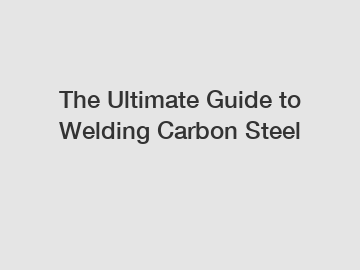Jan. 16, 2024
Mechanical Parts & Fabrication Services
Fusion Product Page
The Ultimate Guide to Welding Carbon Steel: What You Need to Know?
Welding carbon steel is a fundamental skill every welder should possess. Whether you are a professional welder or a DIY enthusiast, understanding the techniques and best practices for welding carbon steel is crucial. In this article, we will explore the ultimate guide to welding carbon steel, covering everything from the basics to advanced tips. Let's dive in!

1. Understanding Carbon Steel:
Carbon steel is a popular choice for welding due to its durability and affordability. It consists primarily of iron and carbon, with small percentages of other elements. The carbon content determines the steel's strength, hardness, and weldability. Low carbon steel is easier to weld, while high carbon steel requires preheating to prevent cracking.
2. Choosing the Right Welding Process:
Several welding processes can be used for welding carbon steel, including shielded metal arc welding (SMAW), gas metal arc welding (GMAW), flux-cored arc welding (FCAW), and submerged arc welding (SAW). Each process has its advantages and limitations, so selecting the right one depends on various factors such as the thickness of the steel, joint type, and desired results.
3. Preparing for the Weld:
Proper preparation is crucial to achieve a strong and clean weld. Start by cleaning the metal surface to remove any rust, dirt, or grease using a wire brush or grinder. Next, bevel the edges of the joint to create a V or U shape, which allows for better penetration and stronger welds. Additionally, make sure the steel is properly aligned and clamped before starting the welding process.
4. Managing Heat:
Heat control is essential when welding carbon steel to prevent distortion, cracking, and other issues. Preheating the steel can help reduce the risk of cracking, especially with higher carbon steels. Additionally, maintaining the correct travel speed and using appropriate welding techniques, such as backstepping, can help manage heat buildup.
5. Selecting the Right Filler Material:
The choice of filler material is significant when welding carbon steel. Matching the filler material's carbon content with the base metal is essential to ensure a strong and durable weld. Common filler materials for welding carbon steel include E6010, E7018, and ER70S-6. It is crucial to understand the characteristics and requirements of each filler material for optimal results.
6. Post-Welding Inspection and Treatment:
After completing the weld, it is crucial to inspect it thoroughly to ensure quality and integrity. Inspect the weld for cracks, porosity, lack of fusion, and other defects. Non-destructive testing methods, such as visual inspection, dye penetrant testing, or X-ray inspection, can be employed for a more comprehensive examination. If any defects are found, appropriate measures should be taken to rectify them.
7. Safety Considerations:
Welding carbon steel involves working with high temperatures and potentially hazardous fumes. It is vital to prioritize safety by wearing appropriate protective gear, including welding helmets, gloves, and flame-resistant clothing. Adequate ventilation is also necessary to prevent the inhalation of harmful fumes. Additionally, ensure the work area is clear of flammable materials and always have a fire extinguisher nearby.
In conclusion, mastering the art of welding carbon steel requires understanding its characteristics, choosing the right welding process, adequately preparing the metal, managing heat effectively, selecting suitable filler materials, and performing thorough post-weld inspections. Following safety protocols throughout the process is vital to safeguard yourself and those around you. With the ultimate guide to welding carbon steel in your arsenal, you are well-equipped to tackle various welding projects with confidence. So, get your welding gear ready, practice diligently, and unleash your welding skills on carbon steel!
Are you interested in learning more about eccentric reducer on pump suction? Contact us today to secure an expert consultation!
Previous: Dredge Pumps: How Can they Revolutionize Water Extraction?
Next: Differences Between Workover Rigs and Drilling Rigs in Oil and Gas Exploration
If you are interested in sending in a Guest Blogger Submission,welcome to write for us!
All Comments ( 0 )